Amazon has
44-Oz Happy Belly Roasted and Salted Peanuts on sale for
$5.05 when following the instructions below.
Shipping is free with Prime or orders $25 or more.
Thanks to Community Member
busybugsy for finding this deal.
Note, you may cancel Subscribe & Save anytime after your order ships.
Instructions:- Click here and select the Subscribe & Save option
- Select any frequency, then click 'Set Up Now'
- Proceed to checkout
- The price should be $5.32 - 5% Subscribe & Save discount = $5.05.
- Complete your order.
- Note: You may cancel Subscribe & Save any time after your order ships.
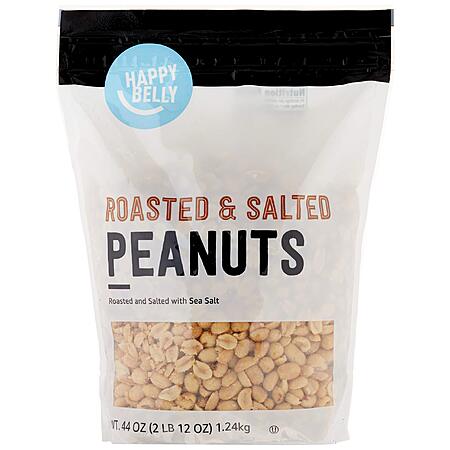
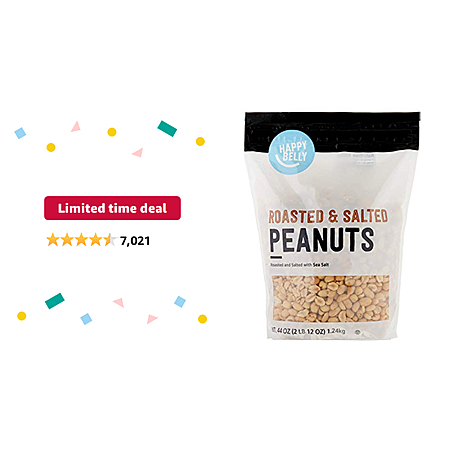
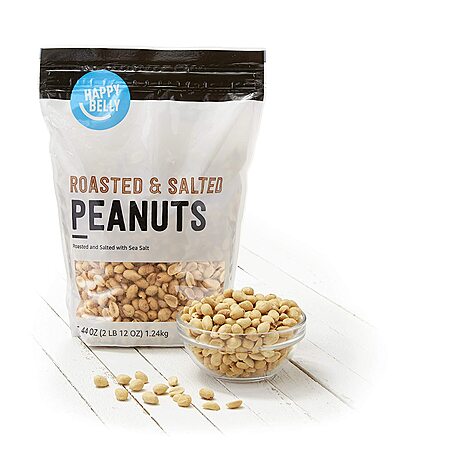
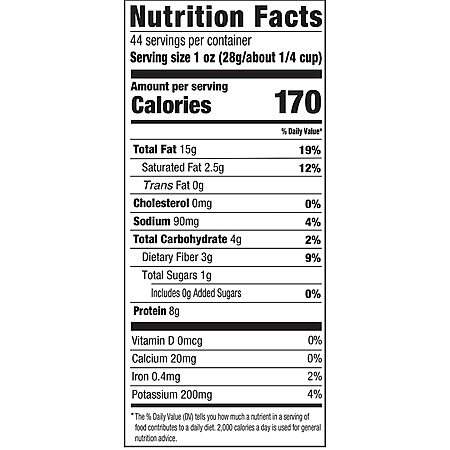
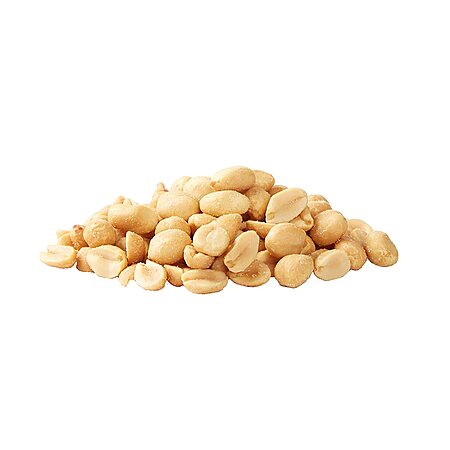
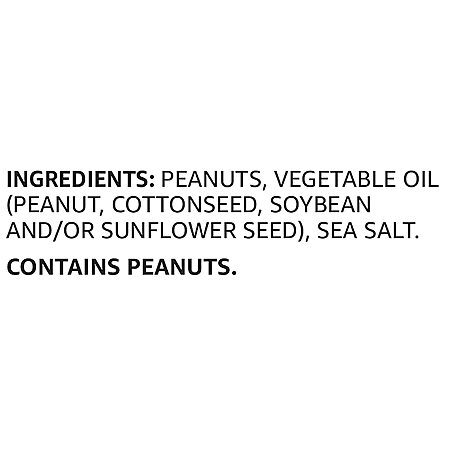



Leave a Comment
Top Comments
"Peanuts are actually a legume and have more protein than any other nut with levels comparable to or better than serving of beans. After the peanut oil is extracted, the protein content in the cake can reach 50 % (Zhao et al. 2011). Peanuts contain all the 20 amino acids in variable proportions and is the biggest source of the protein called "arginine" (USDA 2014). According to Protein Digestibility Corrected Amino Acid Score (PDCAAS) peanut proteins and other legume proteins such as soy proteins are nutritionally equivalent to meat and eggs for human growth and health (FAO 2002). The amino acid profile of the peanut meals shows that it can be an ingredient for protein fortification (Yu et al. 2006). Since the proteins in peanuts is plant based, it carries with it additional components that have positive health benefits like fiber and unique bioactive components, unlike animal protein. The peanut proteins have been found to have good emulsifying activity, emulsifying stability, foaming capacity, excellent water retention and high solubility, and can also provide a new high protein food ingredient product formulation and protein formulation in food industry (Wu et al. 2009). Based on these observations, recently peanut protein has been incorporated into noodles (Wu et al. 2007) and infant formula, (Nimsate et al. 2010). There is a renewed interest in the studies related to the flavors in the peanut kernel and skin (Fig. (Fig.22)."
Hopefully not too many words.
18 Comments
Sign up for a Slickdeals account to remove this ad.
TLDR - pretty good source of nutrition but not a complete protein.
https://slickdeals.net/e/14457071-amazon-brand-happy-belly-roasted-and-salted-peanuts-44-ounce-only-4-16-4-64
TLDR - pretty good source of nutrition but not a complete protein.
"Peanuts are actually a legume and have more protein than any other nut with levels comparable to or better than serving of beans. After the peanut oil is extracted, the protein content in the cake can reach 50 % (Zhao et al. 2011). Peanuts contain all the 20 amino acids in variable proportions and is the biggest source of the protein called "arginine" (USDA 2014). According to Protein Digestibility Corrected Amino Acid Score (PDCAAS) peanut proteins and other legume proteins such as soy proteins are nutritionally equivalent to meat and eggs for human growth and health (FAO 2002). The amino acid profile of the peanut meals shows that it can be an ingredient for protein fortification (Yu et al. 2006). Since the proteins in peanuts is plant based, it carries with it additional components that have positive health benefits like fiber and unique bioactive components, unlike animal protein. The peanut proteins have been found to have good emulsifying activity, emulsifying stability, foaming capacity, excellent water retention and high solubility, and can also provide a new high protein food ingredient product formulation and protein formulation in food industry (Wu et al. 2009). Based on these observations, recently peanut protein has been incorporated into noodles (Wu et al. 2007) and infant formula, (Nimsate et al. 2010). There is a renewed interest in the studies related to the flavors in the peanut kernel and skin (Fig. (Fig.22)."
Hopefully not too many words.
Sign up for a Slickdeals account to remove this ad.
"Peanuts are actually a legume and have more protein than any other nut with levels comparable to or better than serving of beans. After the peanut oil is extracted, the protein content in the cake can reach 50 % (Zhao et al. 2011). Peanuts contain all the 20 amino acids in variable proportions and is the biggest source of the protein called "arginine" (USDA 2014). According to Protein Digestibility Corrected Amino Acid Score (PDCAAS) peanut proteins and other legume proteins such as soy proteins are nutritionally equivalent to meat and eggs for human growth and health (FAO 2002). The amino acid profile of the peanut meals shows that it can be an ingredient for protein fortification (Yu et al. 2006). Since the proteins in peanuts is plant based, it carries with it additional components that have positive health benefits like fiber and unique bioactive components, unlike animal protein. The peanut proteins have been found to have good emulsifying activity, emulsifying stability, foaming capacity, excellent water retention and high solubility, and can also provide a new high protein food ingredient product formulation and protein formulation in food industry (Wu et al. 2009). Based on these observations, recently peanut protein has been incorporated into noodles (Wu et al. 2007) and infant formula, (Nimsate et al. 2010). There is a renewed interest in the studies related to the flavors in the peanut kernel and skin (Fig. (Fig.22).
Hopefully not too many words.
If you check the 1-star reviews, many are complaining the taste
"Peanuts are actually a legume and have more protein than any other nut with levels comparable to or better than serving of beans. After the peanut oil is extracted, the protein content in the cake can reach 50 % (Zhao et al. 2011). Peanuts contain all the 20 amino acids in variable proportions and is the biggest source of the protein called "arginine" (USDA 2014). According to Protein Digestibility Corrected Amino Acid Score (PDCAAS) peanut proteins and other legume proteins such as soy proteins are nutritionally equivalent to meat and eggs for human growth and health (FAO 2002). The amino acid profile of the peanut meals shows that it can be an ingredient for protein fortification (Yu et al. 2006). Since the proteins in peanuts is plant based, it carries with it additional components that have positive health benefits like fiber and unique bioactive components, unlike animal protein. The peanut proteins have been found to have good emulsifying activity, emulsifying stability, foaming capacity, excellent water retention and high solubility, and can also provide a new high protein food ingredient product formulation and protein formulation in food industry (Wu et al. 2009). Based on these observations, recently peanut protein has been incorporated into noodles (Wu et al. 2007) and infant formula, (Nimsate et al. 2010). There is a renewed interest in the studies related to the flavors in the peanut kernel and skin (Fig. (Fig.22)."
Hopefully not too many words.
Nothing you posted means anything here at least not in the context of proving anyone wrong.
Peanut protein is not a complete protein its missing various protein chains and essential fats that are required for a human to function. While they can be a large source of protein other sources will have to be added to come up with a complete protein profile for sufficient human nutrition.
Sign up for a Slickdeals account to remove this ad.
Leave a Comment